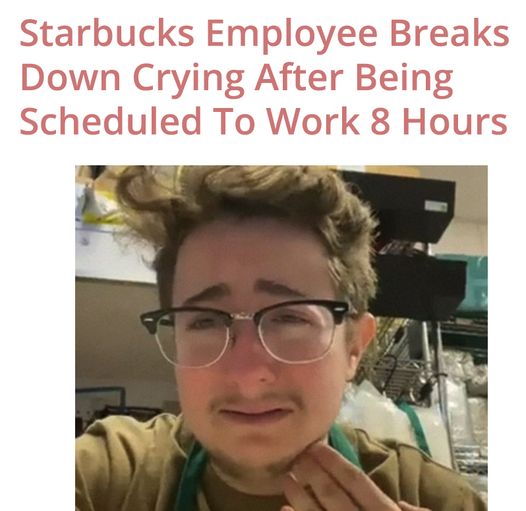On October 17, 2024, a Starbucks barista’s tearful reaction to their work schedule went viral, igniting a larger conversation about worker rights and management practices in the service industry. In the video, shared widely on social media, the barista breaks down as they describe the pressures of their job at the popular coffee chain.

The employee points to inefficient management and rude customers as primary stressors. But it was the eight-hour shift that seemed to push them over the edge. The barista shared their frustration with having to work such long shifts and expressed feeling powerless over their own schedule, a common sentiment among service workers.
Public Reactions and a Broader Discussion
The video drew immediate and passionate responses. Many viewers empathized with the barista, sharing personal stories of dealing with long shifts and difficult customers. This incident has sparked a broader debate about the realities of working in the service industry, particularly the challenges associated with managing extended hours.
One user, @coffeequeen, commented, “As someone who has been in the service industry for years, I understand the frustration of working long shifts and dealing with rude customers. Employers need to do more to create a positive work environment and support their employees.”
Not everyone shared this perspective. Another user, @customerfirst, argued, “I get that customer service is hard, but the barista should be thankful to have a job. Plenty of people would love to have that opportunity.”
These diverse reactions reflect a larger issue within the service sector: the balance between managing long shifts and maintaining worker well-being. While extended hours are a reality in this field, the mental and physical toll on employees cannot be ignored.
Employers’ Role in Supporting Workers
The barista’s breakdown raises significant questions about the responsibilities of employers in creating a positive work environment. While long hours and fast-paced schedules are often unavoidable in the service industry, it’s crucial for employers to recognize the toll this takes on workers. Burnout and stress are well-known problems in this sector, making it essential for companies to treat employees fairly and with respect.
In response to the viral video, the Starbucks manager issued a statement apologizing for the barista’s experience. The statement acknowledged the need for better communication and more support within the workplace: “We take our responsibilities as employers seriously and are committed to fostering a positive and supportive environment for all of our employees,” it read.
This proactive response from management shows a willingness to address employee concerns and improve working conditions. It is encouraging to see steps being taken to acknowledge and address employee struggles, as listening to workers is crucial for building a healthier workplace culture.
The Importance of Listening to Employees
The Starbucks barista’s emotional reaction is more than just a response to an eight-hour shift; it represents deeper issues within the workplace. Employees need to feel that their concerns are valid and that their well-being is prioritized. By actively listening to employees and working collaboratively to find solutions, employers can create stronger relationships and a more supportive environment.
The barista’s outburst was a clear sign of underlying stress and frustration, signaling the need for better communication and support. Employers who pay attention to these signals and respond accordingly can prevent further issues and build a more sustainable work culture.
A Call for Change and Continued Dialogue
The viral response to the Starbucks barista’s video underscores the need for ongoing discussions about worker rights and management practices in the service industry. This incident is not just about one individual’s experience—it sheds light on broader issues that many service workers face, such as work-life balance, fair scheduling, and the need for a respectful work environment.
As more people share their stories and engage in this conversation, it becomes clear that there is a demand for real change within the service sector. By prioritizing employee well-being and creating respectful workplaces, both employers and employees can work together to build a healthier, more equitable work environment. Continued dialogue is essential for shaping a better future in service jobs, ensuring that employees feel valued and supported throughout their careers.




